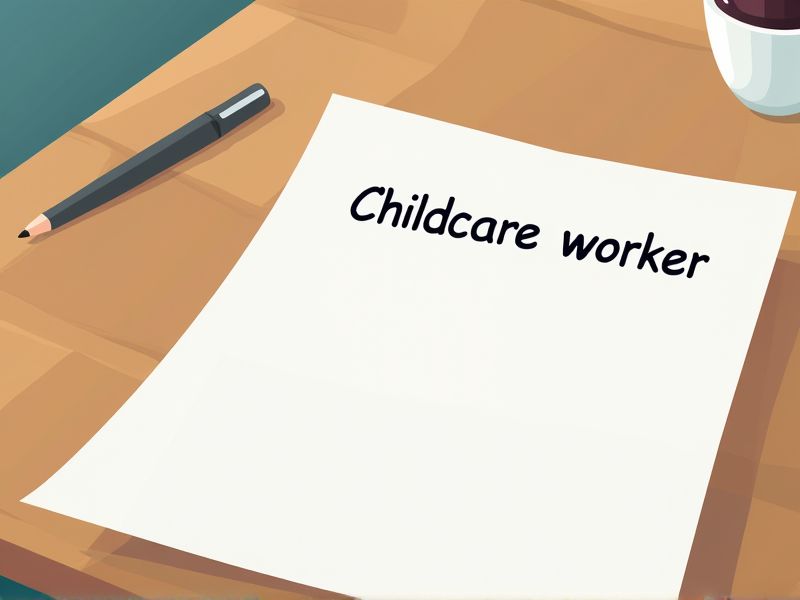
Childcare workers play a crucial role in the early development and safety of children, necessitating specific skills and expertise. Certifications ensure that these professionals meet established standards for child safety, health, and educational needs. Without proper certification, workers might lack critical knowledge in nutrition, emergency protocols, or developmental milestones. Here are some vital certifications you may need as a childcare worker.
Child Development Associate (CDA) Credential
Childcare workers need the Child Development Associate (CDA) Credential as it establishes a standardized level of competency, ensuring they possess the necessary skills and knowledge related to early childhood education. The credential improves job prospects by making workers more desirable to employers who prioritize qualified staff. It enhances the quality of care provided to children due to the trained focus on developmental stages and appropriate educational practices. The credential is often required by state regulations or childcare facilities to meet or maintain licensing and accreditation standards.
Pediatric First Aid Certification
A Pediatric First Aid Certification ensures childcare workers can promptly address injuries and medical emergencies, reducing potential harm to children. Certification equips them with knowledge of child-specific emergency procedures that differ significantly from adult protocols. Parents gain confidence in the childcare provider's ability to safeguard their children, influencing trust and enrollment decisions. Regulatory compliance often requires such certification, ensuring that care standards meet legal and safety guidelines.
CPR/AED Certification for Infants and Children
Childcare workers frequently encounter situations where knowledge of CPR and AED for infants and children becomes critical due to the vulnerability of this age group to choking and respiratory emergencies. Acquiring this certification enhances a worker's ability to respond effectively to emergencies, potentially improving outcomes and reducing recovery times. Parents are more likely to trust and prefer care facilities with certified staff, valuing the increased safety and preparedness for emergencies. Regulations in many regions mandate such certification, aligning childcare practices with legal and safety standards.
Early Childhood Education Certificate
Gaining an Early Childhood Education Certificate equips childcare workers with essential skills in child development, improving their ability to foster a supportive learning environment. This certification ensures that workers understand health and safety regulations, which are crucial for maintaining a secure space for children. It provides knowledge in creating age-appropriate learning activities, enhancing children's cognitive and social development. Employers often require this certification as it signifies a commitment to high educational and professional standards in childcare.
Child Abuse Prevention and Reporting Certification
Child abuse prevention and reporting certification equips childcare workers with the necessary skills to recognize signs of abuse, leading to timely interventions and potentially saving a child's life. Certification ensures that workers comply with legal mandates, reducing the risk of liability for childcare facilities and enhancing overall safety. Knowledge gained from the certification fosters a protective environment, promoting trust among parents, staff, and the community. Continuous education through certification keeps professionals updated on changing legislation and best practices, ensuring consistent and effective response to potential abuse situations.
Infant and Toddler Care Certification
Childcare workers benefit from Infant and Toddler Care Certification by understanding the developmental needs of young children, which enhances care quality. This certification equips them with strategies to address various learning and behavioral scenarios, leading to improved child outcomes. Parents often seek certified providers, as it assures them of the worker's competence and reliability. The certification can also lead to better job opportunities and career advancement within the early childhood education sector.
Special Needs Child Care Certification
Obtaining a Special Needs Child Care Certification enables childcare workers to better understand and meet the unique requirements of children with diverse needs. This certification equips caregivers with specialized skills to handle potential challenges and create inclusive learning environments. Training in this area promotes safety and fosters emotional and social development among children with special needs. Additionally, certification validates the childcare worker's commitment to professional growth and quality care.
Behavior Management Certification
Behavior Management Certification equips childcare workers with effective strategies to handle challenging situations, resulting in a safer and more harmonious environment for both children and staff. By understanding various behavior management techniques, childcare workers enhance their capability to support children's emotional and social development. With certification, workers gain credibility, which can lead to increased trust from parents and guardians. As workplace demands evolve, certified childcare workers are better prepared to address diverse behavioral issues, reducing the likelihood of conflict and promoting a positive learning atmosphere.
Early Intervention Strategies Certification
The early intervention strategies certification equips childcare workers with the skills to identify and address developmental delays in children promptly. This certification ensures that potential issues are managed early, increasing the likelihood of successful outcomes in a child's cognitive and emotional development. Childcare workers with this qualification are better prepared to collaborate with parents and healthcare professionals, fostering a supportive environment. As a result, children benefit from more personalized and effective care tailored to their specific needs.
Health and Safety in Child Care Certification
Health and Safety in Child Care Certification equips childcare workers with knowledge to prevent and respond to potential emergencies, which results in reduced risks of accidents and injuries among children. Trained workers more effectively implement standard safety protocols, influencing a safer childcare environment. Certification strengthens trust among parents, directly affecting enrollment and reputation of childcare facilities. Regulatory bodies often require such certification, impacting the operational legality of childcare centers.
Summary
When you obtain certifications as a childcare worker, your employment prospects improve significantly. This enhanced qualification leads to greater trust and credibility with families seeking childcare services. Employers may offer you higher wages due to your demonstrated expertise and commitment to industry standards. Consequently, your career opportunities and job satisfaction increase as a result.
